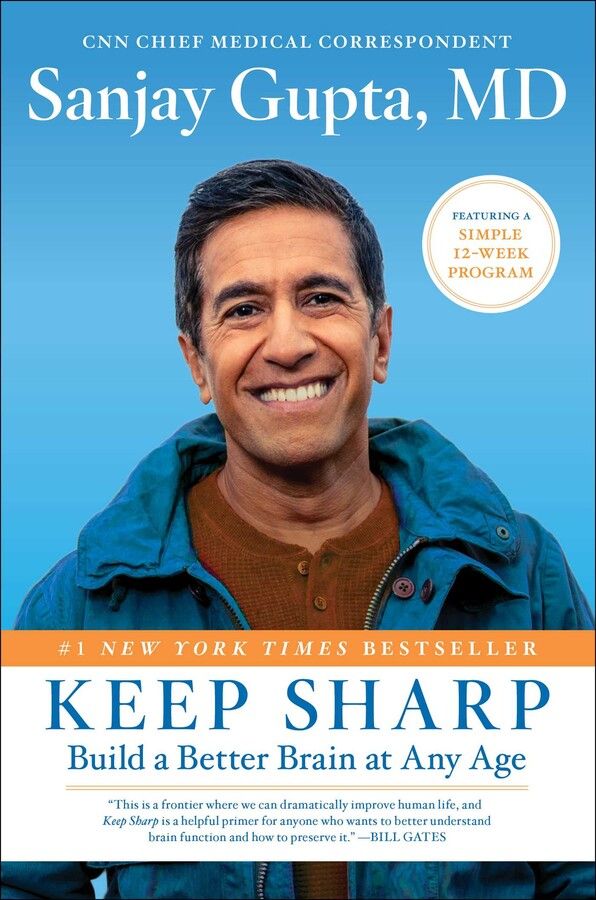Keep Sharp – Sanjay Gupta

The full potential of your brain
How to Keep a Healthy Brain
Your brain is arguably your most important asset and what keeps you going every day. To be our best selves, we need to have it function at its full potential.
People tend to disregard brain health and often think that diseases affecting it, such as dementia, come naturally with old age. However, this is not the case if we choose to care for it ahead of time.
Rest and Relax
- Sleep is when the body rejuvenates and memories are better cemented
- Make sure you don’t have sleep apnea. It causes tissues in the back of the throat to collapse, blocking the airway and preventing deep sleep, the most important phase
- Sleep pills don’t offer the same benefits as natural sleep, avoid relying on them
- Don’t nap for more than 30 minutes!
Other Means of Rest and Relaxation
While sleep is the most important rest mechanism, there are other alternatives you can try during the day:
- Meditation
- Community volunteering
- Express gratitude
- Forgive
- Look for things that make you laugh
- Breaks from email and social media
- Rewards system
- Don’t multitask
- Plan your day around the important, fixed tasks
- Organize your environment
- Daydream
- Seek help if you need it
The S.H.A.R.P. Guide to Good Eating
- Slash the sugar. Go for natural forms of sugar, not processed;
- Hydrate smartly. If you are thirsty, it’s already late;
- Add more Omega-3 fatty acids from dietary sources (seafood, nuts, seeds, beef, lamb, venison), but not supplements! Their effects are not scientifically proven and are unregulated;
- Reduce portions. Don’t go for seconds or eat large amounts of food;
- Plan ahead. Take some time to decide the main meals of the week in advance.
Have an Active Life
- Exercise prevents other diseases than ultimately affect your brain
- Keeping your body in top shape is highly beneficial to any mental activity
- Always find the time to exercise, don’t treat it as something that can be skipped if your schedule gets crowded
- At least 150 min. of moderate exercise per week, 450 min. for the key to longevity
- Weight lifting is not as effective; focus on cardio activities, including jogging, swimming, aerobics, dancing, walking etc.
Connect with People
- The Internet can bring people closer and be beneficial, particularly in these trying times
- Consider adopting a pet if you’re feeling lonely
- Don’t underestimate the power of touch.
Discover and Learn
- Learning will keep you working mentally and will directly stimulate your brain
- Strengthens and creates new connections in the brain, making it more resistant to disease
- Focus on “lifelong education.” Getting a degree in your 20s won’t protect you in your 70s
- Crosswords and even videogames can keep the brain active, but are typically not enough
10 Sleep Tips
- Stick to a schedule and avoid long naps
- Don’t be a night owl (but your ideal bedtime may be later when you are young)
- Wake up to early morning light
- Get moving during the day
- Watch what you eat or drink – no caffeine after lunch and don’t eat or drink for 3 hours before bed
- Mind your medicines (that may affect sleep)
- Cool, quiet and dark place to sleep
- Eliminate electronics (a few hours before bedtime)
- Establish bedtime rituals, such as reading
- Know the warning signs of poor sleep
Myths About the Brain
- The brain remains a complete mystery
- Older people are doomed to forget things
- Dementia is an inevitable consequence of old age
- Older people can’t learn new things
- You must master one language before learning another
- A person who has memory training never forgets
- We only use 10% of our brains
- Male and female brains differ in ways that dictate learning abilities and intelligence
- A crossword puzzle a day can keep the brain doctor away
- You are dominated by either your right or left brain
- You only have 5 senses (there are 6 other senses in the brain)
- You’re born with all the brain cells you’ll ever have, your brain is hardwired, and brain damage is always permanent
The Pillars of Brain Health
There are 5 actions you should follow when it comes to taking care of your brain:
- Move – have an active life, exercise
- Discover – learn new things often
- Relax – take breaks and give your brain time to rest
- Nourish – as the saying goes, “Mens sana in corpore sano”
- Connect – socialization is important
Nourish Your Body
- What you eat has an effect on brain health
- Mediterranean-style diets contain the right nutrients
- Consume vegetables/fruit with thicker skins to avoid pesticides
- Grass-fed animals are healthier
- Use spices, but read the labels!
- Gluten is not proven to affect brain, but may have consequences upon the heart, which ultimately will get to the brain
- Eat a wide variety of different-colored vegetables
- Salt is not good, find alternatives
- Regular smoothies are not recommended, look for chewable ones
- Floss!

